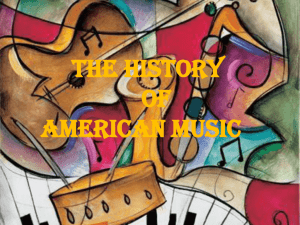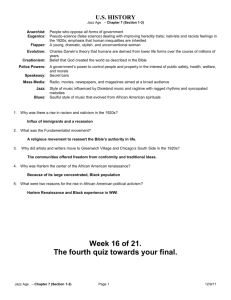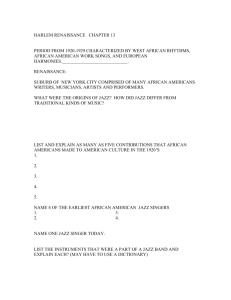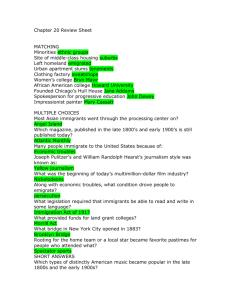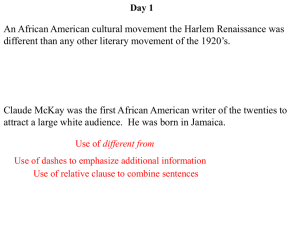From Work Songs to Rock n' Roll
advertisement
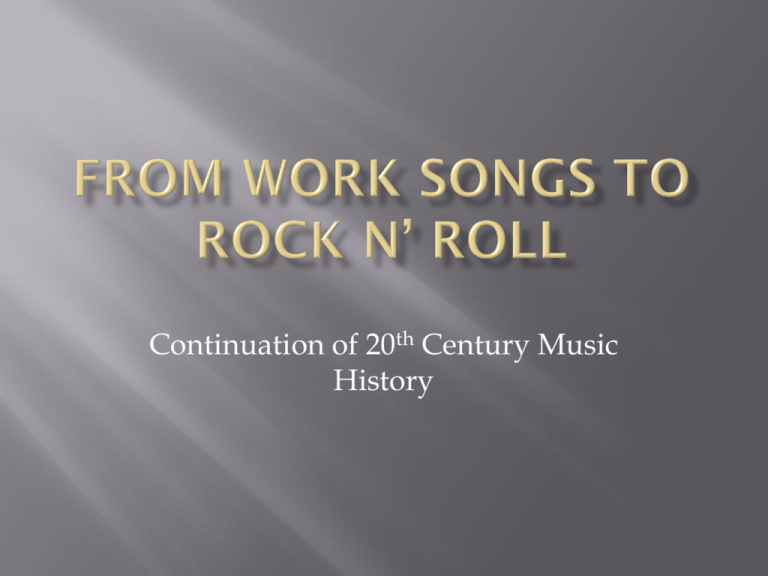
Continuation of 20th Century Music History In 1619, the first Africans were brought to the state of Virginia. They were taken from their happy homes and were forced into crowded ships. When they arrived in America, they were treated very poorly. They were forced to do hard labor. To make the time go by faster, they began singing songs. Following African custom, a leader sang and the other workers sang along, trying to catch the rhythm that would soothe them in their work. This was the first African American musical form: THE WORK SONG. In the early 1800’s the slaves began adopting the religion of their new world. In church they stressed their own cultural identity with songs and dances. With these songs, they expressed their hope for freedom, and a more dignified life. No one knows who wrote these songs they were handed down through generations. This Little Light Of Mine When the Saints Go Marching In He’s Got the Whole World In His Hands In the late 1800’s and early 1900’s, another ancestor of jazz was very popular. Scott Joplin, often called the FATHER OF RAGTIME, composed this lively, rhythmic music for piano. LISTEN TO MAPLE LEAF RAG! The blues sprang out of the southern United States as a way of expressing the worries, joys, and dreams that African Americans had along the road to being accepted in white society. EX. BB King, Stevie Ray Vaughn In the early 1900’s, the new style of African American music, which was now called JAZZ, found its home in New Orleans. Its roots are founded in the Blues and African American folk songs. Joe Oliver was one of the early and very Important figures in New Orleans jazz. Is the single greatest Jazz trumpeter of history to this date. Grew up extremely poor and listening to King Oliver. Added classical style to the jazz genre during the 1920’s Most famous piece “Rhapsody in Blue” Made famous in airline and Cruise Line Commercials Listen Now Duke Ellington was a classy, elegant African American man who became the top attraction in Harlem At “The Cotton Club.” After WWII, many African Americans from rural areas were moving into American cities to work for defense companies. They brought with them their musical tradition of gospel and blues, which then crossed paths with big band music. The result: RHYTHM AND BLUES Ray Charles and James Brown In the 1940’s, the music of African Americans was primarily jazz (which in turn became rhythm and blues), and white music was either country or very schmaltzy pop, as demonstrated in hit recordings by artists such as Doris Day and Pat Boone. When white country and western music, which was popular in the South, converged with rhythm and blues, the rock and roll revolution had begun. Elvis Presley Little Richard Buddy Holly Several white musicians in the 1960’s reverted to folk music that told stories of poor people and those who lived on the edge. Bob Dylan, a young man from the Midwest with a harsh, nasal voice, used this form of music to take on political themes. The Kingston Trio- they popularized a wide range of folk music, particularly songs which protested the war. In the early 1960’s, four poor boys from Liverpool, who had grown up listening to Elvis, Chuck Berry, and Buddy Holly, created a totally new style of music. There influence was greater than any before in popular music – and still is. MOTOWN, a Detroit record label formed by African American businessman Berry Gordy, was the first African American label to record and distribute music by African American artists. The result was a captivating brand of pop music that won over both blacks and whites. Motown was the music of INTEGRATION. Marvin Gaye, Temptations, The Supremes Hard Rock Between the 1960’s and 1970’s came the birth and explosion of hard rock, which eventually was called heavy metal. Hard rock is a direct descendant of the blues, but the sound explodes with loud bass, distorted electric guitars, and screaming vocals. Ex. Twisted Sister, KISS, ACDC, Guns-n-Roses In the 1980’s, videos became a new way to promote rock music. In response, MTV was the first television channel to broadcast music videos 24 hours a day. Artists who benefitted greatly from music videos in the 1980’s include Madonna, Michael Jackson, and the group Queen. The roots of rap go back to the blues and African music. RAP was born in the streets and underground clubs, and is the voice of restless young African Americans. The first rap song to reach the top of the charts was 1979’s “Rapper’s Delight.” Rap music exploded in the 1980’s, thanks to the African American community. A rap song is based on a short musical idea, and repeated over and over. The words often describe the reality of ghetto life in harsh language, along with expressions of pride in African American identity.

